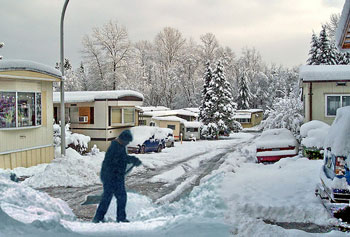
After completing graduate school, my wife, Mikayla, and I, and Maryanne, our 2-year-old daughter, headed for a small town in the North Country where I started my teaching career. We rented a 12 x 60-foot mobile home, and our life in the North Country began.
On the third morning, we were visited by the trailer park manager, Mr. Miller.
“How do, folks? I come by t’ give y’ this list o’ park rules and tell y’ ’bout th’ roof and th’ heat tape.” He gave us a sheet of paper. “Them are th’ park rules. Y’ got t’ keep y’ yard mowed. Y’ yard is th’ land between your home and the next one.”
“I have to get a lawn mower?” I whined.
“Nope. Y’ can ask Ralph next door t’ mow y’ lawn. He’s m’ nephew. Good boy. Does good work. Don’t charge much.”
“It says here that trash has to be deposited between 5 and 6 a.m. every Saturday morning in the Dumpster that’s at the entrance to the park. Trash must not be put in Dumpster any time before Saturday morning? Mr. Miller, why not before Saturday morning?”
“Bears come out lookin’ f’ food at night. They know how t’ get int’ th’ Dumpster.”
“Bears?” Mikayla asked nervously.
“Yup, bears. I wouldn’t go walkin’ ’round at night, if I was you. If y’ do, I’d get a shot gun t’ keep with y’. Anyway, y’ can hire Ralphy t’ take y’ trash t’ th’ Dumpster. He’s m’ nephew. Good boy. Does good work. Don’t charge much. If y’ want Ralphy t’ take y’ trash t’ th’ Dumpster, y’ gotta get a bear-proof trash can t’ leave in front o’ y’ home. You’ll be okay as long as y’ don’t leave food outside and y’ don’t try t’ play with ‘em. They look cuddly, but they like t’ eat people.”
“Oh,” I whined. “Now, what about the roof?”
“Y’ gotta keep snow off y’ roof. When snow on your roof melts, th’ water will get int’ th’ seams ‘n’ drip down int’ y’ home, so y’ have t’ put on a sealer. Y’ put it on with a squeegee-type tool. Y’ c’n ask Ralphy next door. He’s…”
“I know. He’s your nephew. Good boy. Does good work. Doesn’t charge much,” I said.
“Yup. Finally, y’ got t’ know about th’ heat tape. Follow me.”
At the back was an electrical outlet into which was plugged an electrical cord which went under the mobile home. A plastic bubble, in which there was a small bulb, was at the plug-end of the cord.
“That tape is wrapped around th’ water pipe that comes up from th’ well. As long as th’ light is on, th’ tape is workin’. If th’ bulb is out, that means th’ heat tape ain’t keepin’ th’ water pipe warm, which means the water in the pipe will freeze, which means y’ got trouble. If y’ need a new heat tape, y’ …”
“Call Ralphy next door?”
“Nope. Ralph don’t do heat tapes. It’s a nasty job. Y’ come t’ my office and get a few extra heat tapes just in case. Now, don’t f’ get, y’ don’t want t’ let th’ snow pile up on y’ roof. Just get up there and shovel it off, or y’ c’n call Ralphy next door. He’s my nephew. Good boy. Does good work. Don’t charge much. One last thing. Did y’ notice that th’ home is on cinder blocks?”
“Yup,” I replied.
“And y’ can see space between the ground and th’ edge of your home?”
“Yup,” I replied.
“Well, y’ gotta put up a skirt, around y’ home. That’s one o’ th’ rules. Y’ go to a lumber yard. They’ll tell y’ what y’ need t’ build a skirt. When y’ build the skirt, build a door by th’ heat tape, so it’ll be easy t’ get underneath if y’ have t’ crawl under t’ replace a burned-out heat tape in the winter. If y’ want, Ralphy will build the skirt for y. One last thing. Where you folks come from, the cold is different than it is here. When y’ go out in th’ morning, y’ll think it ain’t cold. If y’ go out thinkin’ it ain’t cold and y’ don’t wear y’ jacket, y’ll turn blue b’fore y’ c’n say Jack Rabbit. That’s all, folks,” he said and walked away.

